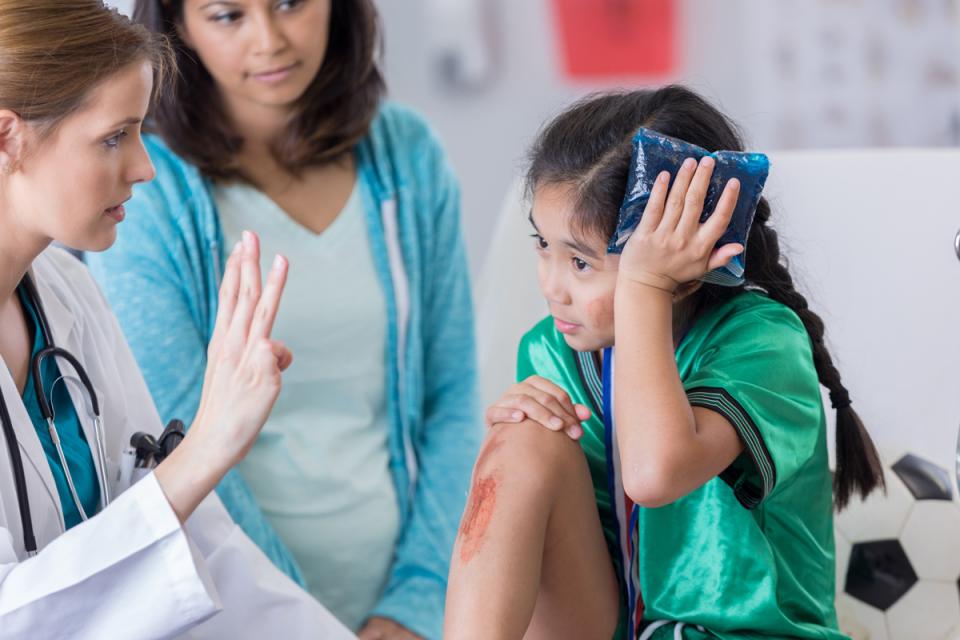Concussion and brain injury
A concussion is a brain injury that can temporarily impair normal brain function. The severity of a concussion can range from mild to severe.
What causes concussions? Normally, the brain floats within the skull, surrounded by a protective cushioning of spinal fluid. While the skull protects the brain from injury, it cannot absorb the full force of a traumatic impact. Any sudden blow to the head, or even a rapid deceleration when driving, can cause a concussion. As the brain bounces against the inner wall of the skull, blood vessels can be torn, nerve fibers can be stretched, and the brain can be bruised. Each of these can lead to bleeding and swelling within the skull.
Persistent symptoms include:
- A headache that won't go away (even with acetaminophen)
- Memory and concentration problems
- Poor attention span
- Intolerance to light or loud noises
- Ringing in the ears
- Depression and irritability
In most cases, a person who suffers a concussion never loses consciousness.
Even with a mild concussion it's possible to have symptoms. A week after suffering a concussion, a person can be sensitive to light, or be irritable or anxious about things that didn't cause anxiety before.
When to seek treatment
It's important not to overreact or under-react. If you're unsure if your child requires medical care for the above symptoms, call your pediatrician or take your child to the emergency department (ED).
Early symptoms that do not go away — or a blow to the head that results in loss of consciousness for more than a few seconds — should be evaluated by a physician, either in the physician's office or the ED. Further persistent symptoms that show up later also should be evaluated by a medical professional.
In fact, the American Academy of Pediatrics (AAP) recommends that you call your pediatrician for advice if your child receives anything more than a light bump on the head. Learn more about seeking treatment for concussions and head injuries on the AAP website.
Young children and concussions
Because infants and toddlers cannot communicate how they feel, concussions can be challenging to diagnose in the youngest children. If you suspect that your young child has had a concussion, look for the following nonverbal clues:
- Listlessness and becoming tired easily
- Unusual irritability and crankiness
- Changes in eating or sleeping habits
- Loss of interest in favorite toys
- Inability to maintain balance when walking
Seek medical attention if your child won't awaken easily, or if he or she seems disoriented or acts inappropriately when awake.
Take it easy
Overall, the best treatment for concussion is rest. Physicians recommend taking a respite from all physical and mental activity — as well as monitoring for new symptoms — for at least two weeks after a concussion. Suffering another injury before the first one heals can set a person up for a lengthier recovery and more problems in the future.
To evaluate a head injury, physicians are less likely to order a CT scan for mild concussions with no loss of consciousness, no nausea and no vomiting, especially in young children. Certainly, a CT scan will be ordered if it is necessary. However, lifelong exposure to radiation must be considered, as well.
The importance of prevention
Each year in Arizona, more than 35,000 adults and children visit the emergency department for brain injuries, including concussions, according to the Arizona Department of Health Services. Approximately 5,000 are hospitalized.
Most of these visits are caused by unintentional accidents — a fall, collision, sports injury or something falling on the head, such as furniture, during a move. Most of these accidents are predictable and preventable. Simply being aware of your environment is the first step to prevention.
Preventing brain injuries
The Brain Injury Association of Arizona offers these tips for preventing concussions and other brain injuries:
- Always use a seatbelt
- Use age-appropriate car seats for infants, toddlers and preschoolers
- Protect playground surfaces with sand, rubber or woodchips
- Be aware of the environment to reduce risk of falls, particularly for toddlers and for the elderly
- Wear a helmet on anything with wheels, even in hot weather, and for sports such as football
